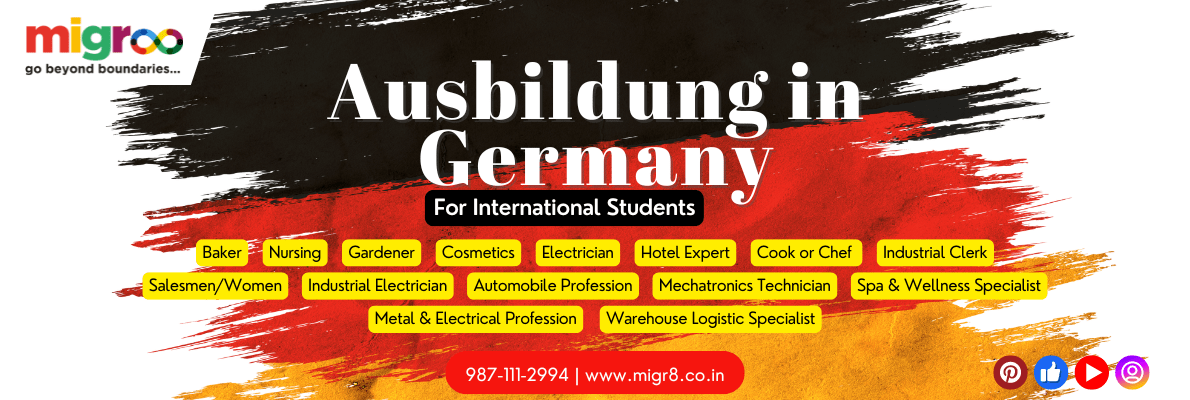Germany is renowned for its high-quality education system, and its vocational training programs, known as “Ausbildung,” are no exception. For international students, pursuing Ausbildung in Germany can be a transformative experience, offering a blend of practical skills, academic knowledge, and the opportunity to immerse oneself in a rich cultural setting. This guide provides a detailed overview of Ausbildung in Germany, including its structure, benefits, application process, and tips for international students.
What is Ausbildung?
Ausbildung, or vocational training, is a dual education system in Germany that combines theoretical instruction with practical work experience. It is designed to prepare students for specific careers by integrating classroom learning with on-the-job training. This system is highly regarded for its effectiveness in equipping students with industry-relevant skills and facilitating smooth transitions into the workforce.
Why Choose Ausbildung?
- Practical Experience: Ausbildung programs emphasize hands-on learning. Students spend a significant portion of their time working directly in their chosen field, which helps them gain practical experience and skills that are highly valued by employers.
- Industry-Relevant Skills: The curriculum is designed in collaboration with industry experts, ensuring that students acquire up-to-date knowledge and skills that meet current market demands.
- Strong Job Prospects: Completing an Ausbildung often leads to strong job prospects. Many students secure employment with their training company or find opportunities in related fields upon completion.
- Cost-Effective Education: Ausbildung programs are typically free of charge, and students often receive a monthly salary or stipend from their training company. This makes it an attractive option for those looking to minimize educational expenses.
- Cultural Experience: Studying and working in Germany provides a unique opportunity to experience German culture, language, and lifestyle, enriching both personal and professional development.
Structure of Ausbildung
The Ausbildung system is structured as follows:
- Duration: Ausbildung programs generally last between 2 to 3.5 years, depending on the occupation and the specific program.
- Combination of Theory and Practice: The training is divided between classroom instruction at a vocational school (Berufsschule) and practical work experience at a training company. This dual approach ensures that students apply theoretical knowledge in real-world settings.
- Curriculum: The curriculum varies by profession but typically includes core subjects related to the field of study, such as technical skills, industry regulations, and soft skills like communication and teamwork.
- Examinations: Students are assessed through regular exams, practical assessments, and a final examination at the end of their training period. Successful completion of these assessments is required to obtain the vocational qualification.
Popular Ausbildung Programs for International Students
Germany offers a wide range of Ausbildung programs across various industries. Some popular fields for international students include:
- Engineering and Technology: Programs in fields such as mechanical engineering, electrical engineering, and IT are highly sought after due to Germany’s strong engineering sector.
- Healthcare: Ausbildung in healthcare professions, including nursing and medical assistance, provide opportunities in a growing and vital sector.
- Business and Administration: Training in business administration, finance, and marketing equips students with skills relevant to the global job market.
- Hospitality and Tourism: Programs in hospitality management and tourism provide practical experience in a vibrant and international industry.
- Creative Industries: Opportunities in graphic design, multimedia, and fashion offer a chance to work in dynamic and creative fields.
Application Process for International Students
Applying for an Ausbildung program as an international student involves several steps:
- Research and Choose a Program: Begin by researching different Ausbildung programs and industries to find one that aligns with your interests and career goals. Websites like the German Federal Employment Agency (Bundesagentur für Arbeit) and specific vocational training institutions provide information on available programs.
- Meet Eligibility Requirements: Ensure you meet the eligibility requirements for the program you are interested in. This typically includes having the appropriate educational background and language proficiency.
- Language Proficiency: Proficiency in German is crucial for most Ausbildung programs, as the instruction and workplace communication are generally conducted in German. Language requirements vary by program, but a B2 level of proficiency is often required. Consider enrolling in a German language course if needed.
- Prepare Application Documents: Prepare the necessary documents for your application, which may include:
- A resume or CV
- A cover letter
- Copies of academic transcripts and certificates
- Proof of language proficiency
- Letters of recommendation (if required)
- Apply to Training Companies: Find and apply directly to training companies offering the Ausbildung program of your choice. You may need to go through an interview process and demonstrate your motivation and suitability for the role.
- Obtain a Visa: If you are accepted into an Ausbildung program, you will need to apply for a visa. The specific type of visa required will depend on the duration and nature of your training. The German Embassy or Consulate in your home country can provide guidance on the visa application process.
Tips for International Students
- Start Early: Begin your research and application process well in advance to ensure you meet all deadlines and have ample time to prepare your documents.
- Enhance Language Skills: Invest time in improving your German language skills before and during your Ausbildung. This will help you navigate daily life and academic requirements more effectively.
- Understand Cultural Differences: Familiarize yourself with German workplace culture and etiquette. Understanding cultural norms can help you integrate more smoothly into your training company and academic environment.
- Seek Support: Utilize resources provided by vocational schools and training companies, including mentorship programs and counseling services. These resources can help you adjust to life in Germany and succeed in your Ausbildung.
- Network: Build connections with fellow students, colleagues, and professionals in your field. Networking can provide valuable insights, support, and potential job opportunities in the future.
- Manage Finances: Although Ausbildung programs are often free, it’s important to budget for living expenses, health insurance, and any additional costs associated with your training.
Conclusion
Pursuing an Ausbildung in Germany offers international students a unique opportunity to gain valuable skills, experience a new culture, and enhance career prospects. With its combination of practical training and theoretical education, the German vocational training system provides a strong foundation for professional success. By understanding the structure of Ausbildung, navigating the application process, and preparing adequately, international students can make the most of their time in Germany and set themselves up for a successful future.
Whether you are interested in engineering, healthcare, business, or any other field, Germany’s vocational training programs offer a pathway to achieving your career goals while immersing yourself in a vibrant and dynamic environment. Start your journey today and explore the possibilities that await you through Ausbildung in Germany.





